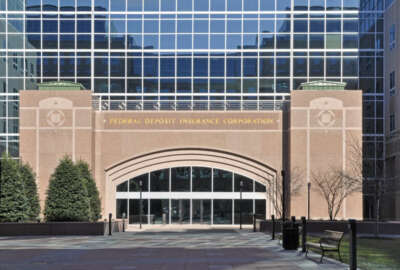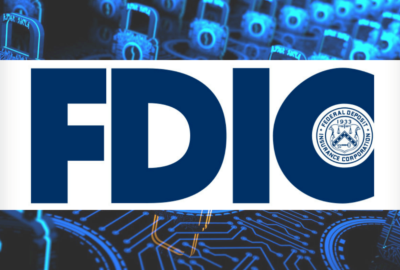FDIC turns to college students for a new perspective on some of its trickiest research questions
The second Annual FDIC Academic Challenge launched just a few weeks ago, this one's focused on the effects of COVID-19 on the banking system.
Best listening experience is on Chrome, Firefox or Safari. Subscribe to Federal Drive’s daily audio interviews on Apple Podcasts or PodcastOne.
For the second year in a row economists at the Federal Deposit Insurance Corporation are turning to college students to help answer some of their toughest research problems, not just by asking students to answer academic questions, but by helping to figure out exactly what questions bank regulators ought to be asking. The second Annual FDIC Academic Challenge launched just a few weeks ago, this one’s focused on the effects of COVID-19 on the banking system. For more, Jared Serbu spoke with Jonathan Pogach, the chief of financial modeling and research at the FDIC, on Federal Drive with Tom Temin.
Interview transcript:
Jonathan Pogach: I think that there’s a lot that is still happening with respect to the pandemic and the associated response. So within the question, we ask students questions on – sub-questions on what do we think the effect of moratoria on evictions might be? That potentially could be something that is still out there. We ask them to potentially consider the effects on banks’ income, via interest income or non-interest income. We also point to changes in other parts of the economy that might still be unfolding, along with the government programs that were implemented as part of the crisis, such as the [Paycheck Protection Program] lending program, all of these things as they roll off, or as we think about their consequences on the economy and therefore the banks going forward are things that we as regulators continue to think about. And I don’t think anyone has fully answered exactly what’s going to happen in the near-medium term.
Jared Serbu: So tell us about the challenge itself and how it actually works. I know this is not the first one you’ve done, but tell us a bit about the mechanics.
Jonathan Pogach: So the challenge was launched on Sept. 9, and by launching what we mean is, we introduced the academic challenge question for the year. We have a notification that goes out to schools all around the country. And we are encouraging interested parties to register their emails, so that we can provide them with new information about the challenge, FAQs, etc. We’re going to have a call-in Q&A on Oct. 6, so that students and faculty advisors can ask us questions directly about the question and how we’re thinking about it, how they might want to be thinking about things. November 19 is a deadline for submitting paper. So students get together, teams of four or five students, along with the faculty advisor, over the course of that two month period are writing a paper, answering the questions within the academic challenge on the pandemic’s effect on the banking system. And then we evaluate those written responses at the FDIC. We have economists looking through all of those and evaluating the submissions. And we select five of those submissions as finalists. The finalists are then invited to Washington D.C., hopefully in person of course, rather than virtual. We’re hoping to do this in person. If not, we did it virtually last year, we of course, can do it virtually again this year. And those five finalists teams present their papers to a team of – to a panelist, a panelist consisting of two FDIC economists, two external judges who come from different banks, and one academic external judge. So a five-person panel, and then after their presentation, get questions from the panelists to probe their understanding of their own material and go further in depth into the work that they’ve done. And then we select a winner, and you have a hopefully in-person celebration.
Jared Serbu: And since this isn’t your first run at this, maybe you can share a little bit about sort of the value or insights that FDIC has gotten out of this process in the past?
Jonathan Pogach: So I think it’s really exciting to see how a new generation of students engages these questions. So last year, the question was the effect of community banks on local economies. And for people at the FDIC or people like myself, who might come from a somewhat different age demographic, from undergraduate students, seeing how students think about the role of community banks last year, versus how people who’ve been in the industry or in the regulatory community for a while – the differences in how they think about things versus how we think about things can be stark. So seeing those students’ perspectives on banks and the roles that they see banks playing in the economy is really quite interesting for us and also helps us understand how banks might continue to engage with different populations in the future.
Jared Serbu: And I noticed in the press release the participants here are all undergrads. Is there a specific reason for that while you’re going after undergrads instead of people who are going master’s degrees in more specialized areas?
Jonathan Pogach: So I think part of the idea of the academic challenge is to get students excited in the topics that we are dealing with as regulators, as bank regulators at the FDIC. And I think part of that is engaging students when they’re still somewhat early in their academic careers. There’s a lot of really fascinating and interesting questions to be answered, as bank regulators. And I think if you talk to students who are already in the master’s program, they’ve already self-selected, they’ve already decided that these are interesting questions when there might be many students at the undergraduate level, who didn’t realize all of the fascinating and interesting things that can be answered. So broadening the scope of students who might one day become involved in the industry, either with us or elsewhere, I think is a really great opportunity and one that the academic challenge highlights.
Jared Serbu: So it sounds like it’s as much a research project for you as it is cultivating the next generation of bank regulators.
Jonathan Pogach: Yes, and not necessarily cultivating just bank regulators just engagement in the field in general, even if they don’t – of course, if they join the FDIC one day, that’s wonderful for us, and I think wonderful, hopefully, for the American economy. But even if they don’t join us, having people thinking about some of these very challenging issues, as regulators, as bankers, as academics, as policymakers, whatever role these students end up playing in the world, having them thinking through these issues, and helping the next generation think through those issues is something that we’re very excited about.
Jared Serbu: And just on our last minute, Jon, as far as what kind of career fields these people might go into if they ever joined the FDIC, just tell us a little bit about what what sort of research questions the Center for Financial Research at FDIC tackles day to day, what sort of topics are y’all interested in?
Jonathan Pogach: People at the Center for Financial Research are interested in a whole host of different kinds of questions. There’s a group that is very much interested in consumer finance issues, and not just a group – groups of people, I would say – who are interested in consumer finance issues. Access to finance and the underbanked – there are people who are very interested in groups that are interested in small business lending. So, how do banks participate in lending to small businesses? There are groups of people within the group who are very interested in risk measurement, trying to think about how we predict banks that might get into future financial difficulty and thinking about methodologies that might help those kinds of predictions. We have a lot of people that are interested in resolutions. We at the FDIC are somewhat unique or are unique in our role in the American economy, in that we are the only organization that resolves banks that fail. So that produces a lot of very interesting data and a lot of very interesting research questions that are somewhat unique to our role. So we have a number of economists who produce research in that area as well. So those are just a few of the areas in which I think our economists are doing really wonderful work. And then for the students who might one day join us, I think this is a little bit of a taste of the kinds of ways that we approach issues. We don’t necessarily know what the right questions are when we start. And as with the academic challenge, “What are the effects of the pandemic on the banking system?” – that is a pretty open-ended question and they really have to figure out what the right questions to be asking within that space are. And I think that’s one of the great opportunities here for us at the Center for Financial Research as we interact with students.
Copyright © 2024 Federal News Network. All rights reserved. This website is not intended for users located within the European Economic Area.





